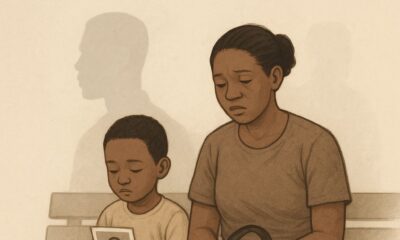Features
Chioma Ozoemelam: Here’s What You Can Do When Your Child Develops a Fever

The classic Nigerian parent’s answer to the question “Does your child have a fever?” is, “No, but he/she has been running temperature.” Well, that’s a yes. Your child has a fever.
Fever is very common in childhood, especially in children who attend daycare, crèche or kindergarten. You might have noticed that during the lockdown, you didn’t have to take your child to the hospital very often or not at all because they were at home and didn’t fall ill.
All kids get a fever from time to time. It is mostly a sign that your body is fighting an infection. Even though it is harmless, it can be a cause for concern. Most of the time, once the cause of the fever is taken care of, your child starts to get better.
What is a fever?
A fever occurs when your child’s body temperature is higher than normal. Your child’s average body temperature ranges from 36.4 to 37.3 degree centigrade. Most people’s body temperature changes a little bit during the course of the day; it’s usually a little lower in the morning and a little higher in the evening, and can vary as kids run around, play, and exercise.
There are two types of fever grades: low-grade fever is a temperature range from >37.4 to 37.9 degree centigrade; high-grade fever is temperature range from 38 degree centigrade and above. A fever helps the body fight infections by stimulating natural defense mechanisms. Recognizing a fever can enable you to get treatment and proper monitoring for it.
Why does my child have a fever?
It’s important to remember that fever, by itself, is not an illness. It’s usually a sign or symptom of another problem. A fever is usually caused by an infection somewhere in the body. Let me make a few things clear: teething does not cause fever. Although there might be a slight increase in body temperature during the period, it is not enough to cause a fever. Also, malaria isn’t the only reason your child has a fever, the same way antibiotics aren’t the cure for every cough and catarrh. But that’s a story for another day.
The causes of a fever include:
- Malaria: Malaria is a major cause of illness in Nigeria. That’s why when children have a fever, parents tend to think it is malaria. Not every fever is caused by malaria. However, it is a major cause of fever in Nigeria.
- Infection: Most fevers are caused by bacterial and viral infections. E.g., respiratory tract infections, gastroenteritis, ear infection, urinary tract infections, chickenpox, etc.
- Immunization: Occasionally, your baby might get a low-grade fever after getting vaccinated, but this is nothing to worry about. Check with your doctor if the temperature gets too high.
- Sometimes overdressing infants, especially newborns, may cause fevers. If they’re over-bundled or in a hot environment, they may develop a fever because they don’t regulate their body temperature as well as older kids.
What to expect when your child has a fever
Your child may:
- Feel hotter than usual to touch. However, it is best to check with a thermometer to get accurate results.
- Be irritable or not want to play.
- Have a reduced appetite.
- Breathe faster or have an increased heart rate.
- Have a change in sleep pattern.
- Have other symptoms of the underlying illness, e.g, body aches, headaches, vomiting, diarrhea, chest pain, etc.
- Children may get sick with a viral illness and develop a fever several times in a year.
- These symptoms will resolve when your child gets better.
What you should do
- Always have a reliable digital thermometer handy. In fact, every parent should have a digital thermometer at home. Monitor the temperature, and write down the figures in case you have to go to a hospital eventually.
- You can usually look after your child at home for a few days if the temperature is not too high.
- Give plenty of fluids to avoid dehydration.
- Check on your child regularly at night.
- Keep them at home, make sure they get plenty of rest.
- Don’t worry about the loss of appetite. Let your child eat what they want (in reasonable amounts), and don’t force them to eat. If you are breastfeeding, offer the breast more often. Their appetite will return once they feel better.
- Consider giving your child paracetamol. Check the label for the correct dose and make sure you aren’t giving other drugs that contain paracetamol at the same time. Do not combine Ibruprofen and paracetamol unless your doctor says you should do so. Call your doctor if you aren’t sure what dose to give.
- Recent guidelines have shown that sponging a child with a fever does not help to lower the fever. Dress your child in lightweight clothing instead. Make sure your child’s bedroom is a comfortable temperature – not too hot or too cold.
When to see your doctor
See your doctor if:
- You don’t know what to do.
- Your baby is under 6 months old.
- Your child refuses to drink for 12-24 hours.
- Your child has excessive vomiting or diarrhea.
- You suspect your child is dehydrated.
- Your child complains of a stiff neck or light hurting their eyes.
- Your child is drowsy, sleepy, or looks unwell.
- Your child develops a rash.
- Your child doesn’t get better in two or three days.
- Your child has a problem with breathing or is in pain.
- Your child has a seizure.
When speaking to your doctor, make sure to tell them all your child’s symptoms and temperature readings. Your doctor will examine your child and carry out some laboratory investigations. This will help them determine the cause of the fever and an effective course of treatment. If you’re ever in doubt about what to do, what a fever might mean, or if your child is acting ill in a way that concerns you even if there’s no fever, always call your doctor for advice.
***



















